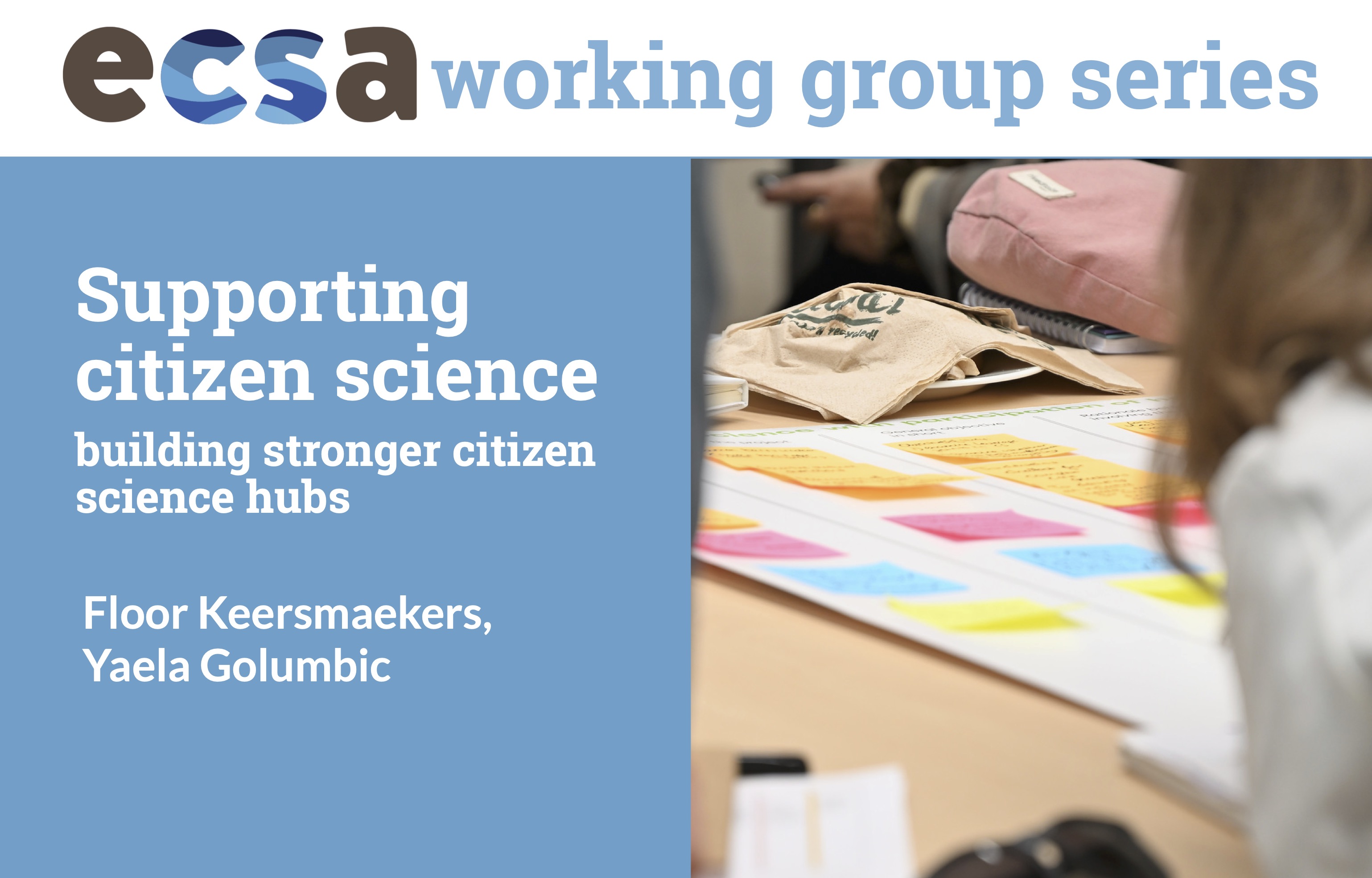
Supporting citizen science: building stronger citizen science hubs
Yaela Golumbic
Oct. 9, 2024, 8:50 a.m.
Authors: Floor Keersmaekers, Yaela Golumbic
This article inaugurates the new ECSA working group series that recounts the experiences developed within the ECSA working groups with the wider citizen science community.
Supporting and facilitating citizen science is a key topic for our community — as resulted from the April workshop held at the ECSA2024 conference in Vienna — and on July 8th, our working group gathered to address it.
What exactly does “supporting and facilitating citizen science" mean? Well, according to our members this includes raising awareness, crafting guides, developing user-friendly digital tools, planning citizen science events — and more.
We kicked things off with an inspiring presentation from Floor Keersmaekers, the coordinator of the Citizen Science Contact Point at Vrije Universiteit Brussel, Belgium. Floor walked us through some of the real-world challenges faced when supporting citizen science in university settings. Imagine trying to work with researchers to advance their citizen science practice, while respecting their need for ownership and independence, but at the same time working within the top-down structure of a vice-rectorate of research. Add to that the task of building a thriving citizen science community, conducting self-evaluation and measuring the impact of your citizen science support service for researchers.
It turns out these challenges are not unique to Floor’s work. We used an interactive digital platform to share challenges from other members of the group and voted on the most pressing challenges we’d like to discuss together. The issues ranged from involving institutions outside the university like libraries and museums, to kickstarting a citizen science hub, to navigating the tricky waters of grant offices and ethical committees (see Figure 1). But the question most members were interested in discussing was, "How do you implement the evaluation of your citizen science hub activities?" With that in mind, we dove into a brainstorm session to strategise…

Figure 1. working group member responses to the question “what challenges would you like to discuss with your peers”
Evaluating your citizen science hub activities
Our first task? Listing all the key players who should be involved in evaluating a university citizen science hub. Many ideas were raised, and when discussing their roles we noticed different stakeholders could be involved in different stages of the evaluation:
Before or during evaluation:
- Researchers from relevant disciplines: These folks aren’t directly involved in citizen science projects but are experts in the field. They can weigh in on the scientific rigor and methodological aspects.
- Open science departments / Research libraries: Collaborate with these colleagues for a solid evaluation framework, clear quality criteria, and to raise awareness.
- Stakeholders/communities: It goes without saying — evaluation of public engagement in research’ activities should involve members of the public we aim to engage!
After evaluation:
- Funding agencies: They’re key, as evaluation reports can help convince them to continue (or start) supporting your work.
- Rector and university community: They should be informed, and aware of what you’re doing. Use those evaluation reports to share success stories for your internal communication!
From there, we brainstormed how these ideas could be put into motion and what actions we could take to address the evaluation challenge. We debated the merits of qualitative vs. quantitative evaluation and the tricky balance of not overloading our stakeholders. One standout point was the need to measure success by focusing on researcher needs rather than just providing services. Setting KPI’s is another way to evaluate if the hub’s goals are being met. A recurring theme was the need for a tool or briefing document, or perhaps even an orientation session to help everyone get on the same page.
The past years have brought a wealth of research and practice on the topic of citizen science evaluation. Existing examples for evaluation measures that were mentioned include: MICS, CSISTA Impact Inquiry Instrument, CitieS Health Impact Assessment Survey, Quality & Success Factors Matrix for Citizen Science based on ECSA’s 10 Principles; ACTION Impact Assessment Canvas. However, these are focused on citizen science activities or projects, rather than hubs proving widespread support (see resources listed below this blog post, for additional resources). By leveraging the diverse expertise and resources within universities, we can turn the challenges of supporting citizen science into unique opportunities. For example, involving social scientists working at universities in the evaluation process can supplement needed expertise and enrich the process and learnings. Tapping into the expertise available within our universities through collaboration and strategic engagement, can advance academic institutions to become leaders in citizen science, driving impactful research, and fostering stronger connections between science and society.
In summary, our latest meeting was full of ideas, challenges, and collaboration, all aimed at making citizen science not just possible, but impactful and sustainable. We left with plenty to think about — and even more to do! Want to dig deeper? Check out some resources and examples listed below this post.
Stay tuned for more adventures in the world of citizen science.
Resources
On challenges and how to address them:
- Article by Scivil: https://www.scivil.be/en/news/looking-back-our-workshop-common-challenges-citizen-science
- TIME4CS Statement to encourage Institutional Changes to promote Citizen Science. See - 3.1.1 Recommendations for RPO’s and professional scientists
On the evaluation of the institutionalisation of citizen science/support of citizen science within RPO’s: TIME4CS Monitoring Toolkit
On the monitoring and evaluation of CS Hubs:
- INCENTIVE Monitoring & Evaluation Framework
- Poster by LIBER CS Working Group with good practices/inspiring examples!
- Blog by Nel Coleman: https://coeso.hypotheses.org/7071